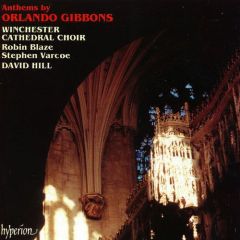Gibbons - Anthems & Verse Anthems (1999)
Gibbons - Anthems & Verse Anthems (1999)

[01] Hosanna to the son of David 2'44 [02] Sing unto the Lord 5'55 [03] This is the record of John 4'18 [04] If ye be risen again with Christ 4'47 [05] O Lord, in thy wrath rebuke me not 3'50 Second Evening Service [06] Magnificat 6'10 [07] Nunc dimittis 3'22 [08] Behold, thou hast made my days 4'33 [09] O God, the king of glory 4'13 [10] Glorious and powerful God 5'10 [11] Fantasia in A minor (organ solo) 5'07 [12] O clap your hands 5'32 [13] Thou God of wisdom 5'49 [14] Blessed are all they that fear the Lord 4'42 [15] Great king of gods 4'43 Robin Blaze - countertenor Stephen Varcoe – baritone Stephen Farr, Sarah Baldock - organ Winchester Cathedral Choir David Hill – conductor Recorded in Winchester Cathedral on 28-30 April 1999
Orlando Gibbons was one of the most important English composers of the early 17th-century. He was a chorister at King's College, Cambridge, and later became a gentleman of the Chapel Royal, which he served as an organist and to which he later added the position of organist at Westminster Abbey.
He wrote forty anthems including the well-known This is the record of John—here sung by the brilliant young countertenor Robin Blaze—and is still regarded as one the of the great masters of the 'verse' anthem. A good example of a 'verse' anthem is Hosanna to the son of David where solos for one or more voices are repeated and reinforced with short choral passages. The 'full' anthem on the other hand does not use solo voices, as illustrated by the eight-voiced O clap your hands. --- hyperion-records.co.uk
Only three of Gibbons’s verse anthems are scored for a single soloist. Two of them included here (This is the record of John and Behold, thou hast made my days) have the solo in the alto part, the voice most commonly written for among all the verse parts. The alto voice is also the one most frequently divided in the five-part textures of the choruses. Of the remaining verse anthems here, Glorious and powerful God features an alto-and-bass duet throughout the verse sections, while others use contrasting groups of soloists. For several of the anthems there are extant viol accompaniments which, given the total lack of evidence that these were ever used in church, may mean that secular performance was considered an alternative. This might point to the origin of some of the anthems not being entirely liturgical.
One anthem which clearly belongs outside the church, but which has here been given a religious sheen by performing its accompaniment on the organ, is Great king of gods. The main basis for its inclusion is its quality, and that it is otherwise left ‘stranded’ in the repertoire. It is an occasional piece written for the visit King James I paid to Scotland, amidst much local opposition, in 1617. Philip Brett has conjectured that it was given as the king arrived at Holyrood Palace, his entire Chapel Royal having travelled there from London by ship. In the 1870s a more directly ecclesiastical text, ‘Great Lord of Lords’ was substituted.
There are two settings of the evening canticles. The First or Short Service (not recorded here) is almost entirely homophonic and for full choir, whereas the Second Evening Service is an elaborate setting with numerous verses. The edition used has been prepared mainly from the version published in John Barnard’s compilation Selected Church Music of 1641. There are instances where this source does not include all the voices in the verses seen in other editions. At ‘for behold from henceforth’ the tenor, which has been known to modern editions since the 1920s, may be spurious; at the opening of the Nunc dimittis there has been an additional even more questionable treble part derived from the organ. The textual underlay, which E H Fellowes sought to modernize, has been restored and, in general, the organ accompaniments are heard in these recordings without the dubious benefit of the considerable accretions and ‘imitative ingenuity’ applied in his editions some seventy-five years ago.
The variety of texture and compositional devices in the verse anthems show Gibbons at his best, although his stature in this field has grown largely in the past forty years. Perhaps Fellowes’s readiness to adjust and ‘improve’ was because he originally held Gibbons’s full anthems to be superior, the verse anthems at ‘a decidedly lower level’. But the verse style was a product of its age and Gibbons its main exponent. Had he not died young, as John Harley has remarked, Gibbons’s innovation might have come to have been more directly influential. As it was, the verse anthem form itself, through Henry Purcell, Maurice Greene and William Boyce, became the basis of many cathedral anthems for a century and a half after Gibbons. In 1636, in his Principles of musik, Charles Butler was able to enthuse on the verse style: ‘a solemn Anthem, wherein a sweet melodious treble, or countertenor, singeth single, and the full quire answereth (much more when two such single voices, and two quires interchangeably reply one to another, and at the last close all together) … maketh such a heavenly harmony, as is pleasing unto God and Man’. --- Andrew Parker, Hyperion
download (mp3 @320 kbs):
yandex mediafire uloz.to mega 4shared cloudmailru gett








